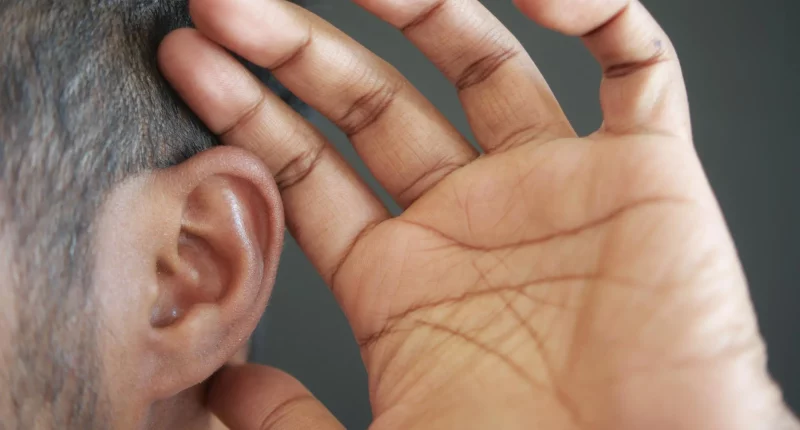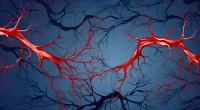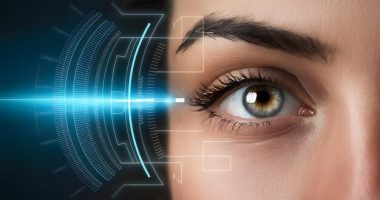An acoustic neuroma is a growth that’s not cancerous and happens on the nerves from the inner ear to the cerebrum. These nerves help with balance and hearing. When the tumor grows, it messes up how these nerves work, causing problems like hearing loss and a ringing sound in the ears, called tinnitus.
As the tumor gets bigger, it can affect the nerves in the brainstem and cerebellum, and even put pressure on the brain. This can be very dangerous. However, it doesn’t extend to other areas of the body.
Sometimes, doctors call it by different names like auditory nerve tumor, vestibular schwannoma, or acoustic neurinoma.
Our nerves usually have a coating called Schwann cells, which help them work well. But if these cells start growing too fast over the eighth cranial nerve, an acoustic neuroma can form.
The tumor typically grows gradually over many years, but sometimes, symptoms can suddenly appear.
Acoustic neuromas are rare. They only affect about 1 in over 100,000 population. In the United States, there are about 2,500 new cases every year, and it often happens to people between 30 to 60 years old.
Treatment
Treatment is influenced by various factors, such as:
- Age and Health: The age and overall health of the person affected are important considerations for treatment.
- Size and Location of the Tumor: Where the tumor is and how big it is also affecting treatment decisions.
Sometimes, doctors might suggest just keeping an eye on the tumor without doing anything else. This is called “watchful waiting.” If the tumor is small or grows slowly, it might not need treatment right away.
But if treatment is needed, there are different ways doctors can approach it:
Radiosurgery
This treatment uses radiation therapy to target the tumor very precisely. It’s often called the “gamma knife,” and it’s a noninvasive treatment, which means no surgery is needed.
Here’s how it works:
- The person gets local anesthesia to numb the head.
- Then, a lightweight head frame is attached.
- Imaging scans help the doctor pinpoint the tumor’s location and guide where to aim the radiation beams.
The person might need multiple sessions of treatment. It can take a while—weeks, some months, or even years—before they notice the results of the treatment. And sometimes, the tumor can come back.
Radiosurgery is typically an option if the tumor is 3 centimetres (cm) or smaller.
Microsurgery
Microsurgery is a method where a surgeon cuts into the skull, under anesthesia, by using specific tools to take out all or some of the tumor.
Sometimes, the surgeon can’t remove the whole tumor because it might hurt the facial nerves. Hurting these nerves could make the face paralyzed.
After microsurgery, a doctor might use radiosurgery to shrink the tumor more or get rid of any tiny bits left. Radiosurgery aims radiation very precisely, so it doesn’t hurt healthy tissue over the tumor.
Post Surgery
After the surgery, the doctor keeps an eye on how the person gets better and looks out for any signs that the symptoms might come back.
Sometimes, there’s a big chance of losing hearing after the surgery, mainly if there’s a tumor on both hearing nerves. If that’s the case, the doctor might say it’s better to wait before doing the surgery.
Some other things that might happen because of the treatment include:
- Feeling dizzy
- Having a weak or numb face
- Not being as mentally sharp if there are blockage or blood clots of fluid in the brain
- Maybe having eye problems like seeing double or a droopy eyelid if the treatment messes with the nerves
Scientists are also checking out some new ideas for treatments in the future, like:
- Seeing if aspirin can help stop tumors from growing
- Trying out new medicines to stop the cell stuff that makes the tumor grow.
Signs
Major signs of the Acoustic neuroma are:
- Loss of hearing in one ear is common, happening in about 90 percent of individuals with this condition.
- Tinnitus (Ringing in the ears)
- Ear pain, like an ache.
- Feeling dizzy, unbalanced, or like everything’s spinning (vertigo), especially if the tumor targets the inner ear.
- Losing feeling, sometimes just on one side of the mouth and face.
- Not being able to taste things well on the back part of the tongue.
- Headaches, throwing up, and not being fully aware of what’s going on (altered consciousness) can happen if a big tumor keep stress on the brain. Sometimes, there can also be problems with vision.
Acoustic neuromas grow slowly, but if they get big, they can press on important parts of the brain and become dangerous if not treated.
Doctors sometimes talk about the size of an acoustic neuroma like this:
- Small: When it’s under 2 cm (about three-quarters of an inch) in size.
- Medium: When it’s 2 to 4 cm (about three-quarters of an inch to one and a half inches).
- Large: When it’s 4 cm (about one and a half inches) or more.
Causes
The exact reason why Schwann cells start multiplying and causing an acoustic neuroma isn’t totally clear. Most of the time, there’s no clear reason behind it. But there are a few things that might make it more likely to happen:
- Age: Acoustic neuromas often show up between the 30 to 60 aged people.
- Family History: Sometimes, a condition called Neurofibromatosis type 2 (NF2) can inherited in families. But this only happens in about 5 percent of event.
- Radiation Exposure: Being exposed to a lot of radiation on the neck and head when you’re a child might raise the chances of getting it at another time in life.
Some studies think that being around loud noises for a long time might be linked to it. Some folks have wondered if using cell phones could make it more likely, but studies don’t back this up.
Neurofibromatosis type 2 (NF2) is a condition where a person can get acoustic neuromas on both sides of their head. This usually happens because of genes passed down in the family.
Individuals with NF2 often have tumors in their brain and spinal cord. These can mess with lots of nerves and how the body works.
Diagnosis
To figure out if someone has an acoustic neuroma, the doctor will first talk to them about their symptoms and then do an exam.
If the doctor thinks it might be an acoustic neuroma, they’ll probably ask for an MRI scan of the person’s head. This special kind of picture can show if there’s a tumor, location, and how big it is.
To make sure it’s really an acoustic neuroma and not something else causing dizziness, loss of hearing, the person might also have some other tests:
- A hearing test
- A balance test
- A test to see how well the brainstem is working
There are other conditions that can have similar symptoms, like:
- Meningioma: This is a tumor that grows on the lining of the brain.
- Meniere’s disease: This affects the inner ear and can cause hearing loss and dizziness.
- Neuritis: This is when the nerves get swollen and cause problems.
- Atherosclerosis: This happens when the blood vessels get narrow.
Complications
Having an acoustic neuroma can lead to some problems, like:
- Hearing Loss: Even after treatment, some people might still have trouble hearing.
- Feeling Dizzy and Unbalanced: This can make it hard to do everyday things.
- Facial Palsy: Sometimes, if the surgery, or infrequently, the tumor as such affects a nerve near the acoustic nerve, the head might hand down on one side. This can make it tough to swallow and talk clearly. It’s called facial palsy, or Bell’s palsy.
- Hydrocephalus: If a big tumor pushes against a part of the brain called the brainstem, it can mess with how fluid moves between the brain and the spine. If too much fluid builds up in the head, it can cause hydrocephalus.
There’s no surefire way to stop acoustic neuromas from happening, but scientists are looking into gene therapy to try to control how fast Schwann cells grow.
External Links









